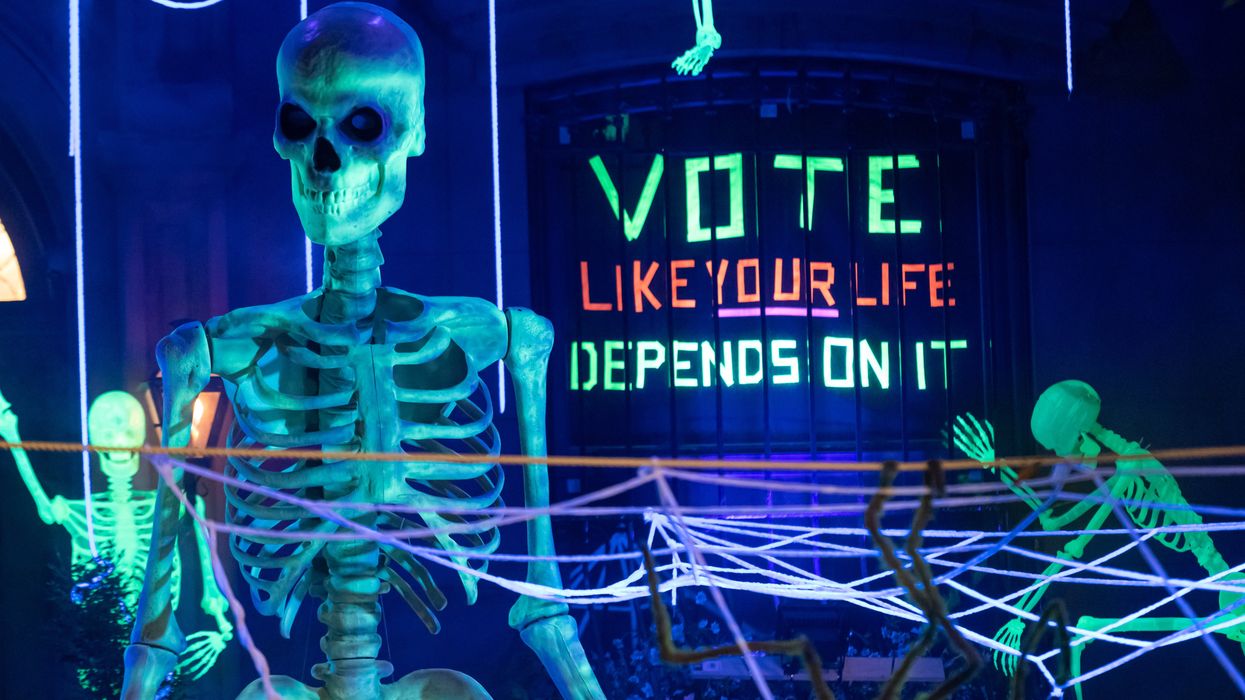Nevins is co-publisher of The Fulcrum and co-founder and board chairman of the Bridge Alliance Education Fund. Becvar is co-publisher of The Fulcrum and executive director of the Bridge Alliance Education Fund.
Halloween, a holiday celebrated around the globe, traces its roots back to the ancient Celtic festival of Samhain. The event marked the end of the Celtic year and symbolized a time when the boundaries between the living and the dead blurred, allowing spirits to roam among the living.
While Halloween is often associated with fear, darkness and death, it also represents an opportunity to confront our fears in a communal way. We dress up, share stories of ghosts and let ourselves feel scared for fun. Ironically, this holiday centered on facing fears falls less than a week before the elections, a time when many are most politically afraid. This Election Day, a majority of Americans are feeling fear about the outcome of the presidential election, which falls five days after Halloween, with some fearing what happens if Kamala Harris gets elected and some fearing what might happen if Donald Trump wins.
As the candidates sprint to the finish line, they are both playing on this fear.
As Arash Javanbakht, an associate professor of psychiatry at Wayne State University, noted in The Fulcrum in August,
“Instead of excitement about the upcoming election, many of my patients and friends – regardless of political affiliation – report they’re terrified at the thought of the ‘other side’ winning. Democrats tell me they fear Donald Trump will end our democracy; Republicans are afraid Kamala Harris will turn the United States into a socialist society without family values.”
The fears may differ, but the undercurrent of anxiety is remarkably similar.
However, Halloween offers a timely reminder of how we might handle this political dread. It is an opportunity to reframe our fears through costumes, parties and community activities; and to transform those fears into something more constructive. What if, this Halloween, we took a similar approach to our political anxieties? Imagine if, instead of succumbing to anger, dread or even hatred arising from our political disagreements, we transformed that negative energy into empathy and curiosity.
The image of children trick-or-treating is so common that it almost seems transactional, but underneath the joy of receiving a treat from a stranger is a simple act of communities coming together to share in the simple pleasure of giving and receiving, no matter who is under the costume. This exchange, unburdened by judgment or assumptions, is a small but powerful example of how different members of a community can come together to share in a common idea, if only temporarily.
What if we, too, allowed ourselves to adopt this open-hearted spirit, especially when it comes to politics? Rather than seeing those with opposing viewpoints as enemies, what if we approached them with the same curiosity and openness that children bring to each new house on Halloween night? After all, just as no one knows what candy lies behind a neighbor’s door until they knock, we cannot fully understand another person’s perspective until we are willing to engage with it.
Elvis Presley’s song “Walk a Mile in My Shoes” captures this spirit perfectly. Before he sang those famous words in Las Vegas in 1970, he introduced the song with a message:
“There was a guy who said you never stood in that man's shoes or saw things through his eyes or stood and watched with helpless hands while the heart inside you dies. So help your brother along the way, no matter where he starts for the same God that made you, made him too, these men with broken hearts. I'd like to sing a song along the same lines.”
On this Halloween, as we navigate haunted houses and neighborhood streets, we might also take a moment to consider the fears that haunt our political landscape. What if we tried, even briefly, to imagine life from the perspective of those who see the world differently? Could we find a way to turn our collective anxieties into opportunities for connection, rather than letting them deepen our divisions?
Elvis’s song might provide the soundtrack for this effort, reminding us that while fear and division can be powerful, so too can understanding and compassion. This Halloween, let’s try on a new costume — one that sees beyond fear and strives for a deeper understanding of our neighbors. It might just be the treat that our democracy needs.
- YouTubewww.youtube.com



















Trump & Hegseth gave Mark Kelly a huge 2028 gift